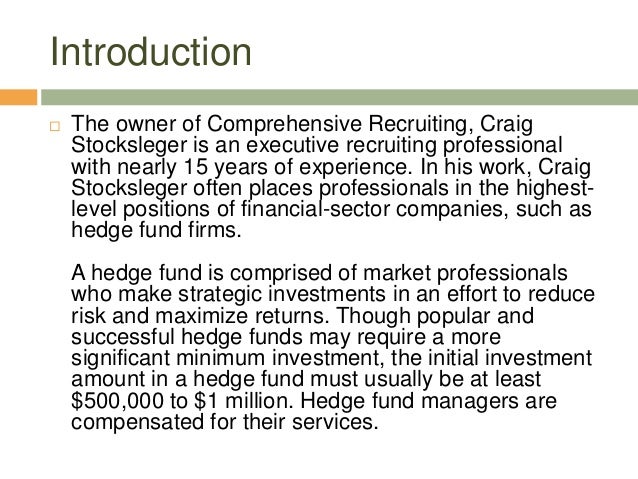
Merger arbitrage: Whenever a company merges with another, the acquired trades at a discount.Long and short positions are taken in all types of securities including derivatives. Event-driven strategies The main aim of event-driven strategies is to generate profit from short-term events.Some of the most commonly-used hedge fund strategies are: The different strategies determine how a hedge fund makes money. Rather than types of hedge funds, the types of strategies they deploy that differentiate one from the other. Regulatory requirement: SEBI lays down guidelines for the regulation of hedge funds.Because of this feature, these funds are also known as “absolute return” products (as there is no relative returns to compare with). Performance measurement: The performance of hedge funds is not measured against a benchmark or index.In the west, the fee structure is “2 and 20”. Fee structure: Usually the fee structure is “1 and 10-15”, which means the fund manager is entitled to a 1 percent fee on the total asset under management, either at the start of the year or at the end of the year, and a 10-15 percent of the total profits generated throughout the year.For example, funds may only be withdrawn bi-monthly or quarterly, depending upon the scheme. There is also a restriction on the withdrawal of funds. Lockup period: Hedge funds usually have a lock-in period of one year.Also, the minimum pool of funds required to start a hedge fund is Rs 20 crores. Investment requirement: The minimum investment requirement in hedge funds is Rs 1 crore and the maximum number of investors is limited to 1,000.Instead, hedge funds in India are identified with the help of their most common characteristics.

While our interest is in hedge funds today, there is no universal definition for them in securities laws. Hedge funds, funds which trade with a view to making short-term returns or funds which are open-ended and for which no specific incentives or concessions are given by the government or other regulators are included.

(c) Category III - AIFs that employ diverse or complex trading strategies, which may employ leverage through investment in listed or unlisted derivatives. So, AIFs such as private equity funds or debt funds for which no specific incentives orĬoncessions are given by the government or any other regulator are included. (b) Category II - AIFs which don’t fall in Category I and III, and which don’t undertake leverage or borrowing other than to meet daily operational requirements, and as permitted in SEBI‘s regulations. These are the funds for which Sebi, the Government of India, or other Indian regulators may consider providing incentives or concessions. It shall include venture capital funds, SME Funds, social venture funds, infrastructure funds, and such other alternative investment funds as may be specified.įor our understanding, those AIFs which are perceived to have a positive spillover effect on the economy. (a) Category I - Comprises AIFs which invest in start-up or early-stage ventures, social ventures, SMEs (small, medium enterprises), infrastructure, or other sectors or areas which the government or regulators consider as socially or economically desirable. In a May 2012 circular, SEBI classified alternative investments into three categories. To understand hedge funds in India better, we should appraise ourselves with what SEB Imeans by an AIF and its three categories. While it may sound complicated, we should remember that investments in assets such as commodities and real estate that many of us may be familiar with are also considered as alternative investments by SEBI. Hedge funds in India are categorized under alternative investment funds (AIFs) as defined by Sebi.Īn alternative investment is one different from traditional long-only positions in stocks, bonds, and cash. Hedge funds are set up as LLCs (limited liability companies) or LLPs (limited liability partnerships) where the liabilities of the partners and fund manager are limited. In a hedge fund, the fund manager pools money from investors (partners or shareholders) and uses various unconventional strategies to earn profits. The answer to the question, ‘What is a hedge fund in simple terms’, is this: It is a pool of funds making investments in illiquid investments using unconventional strategies. So, what are they really? Hedge fund in India Hedge Fund meaning What is a hedge fund in simple terms?


The history of hedge funds can be back to 1949 when a sociologist and former writer Alfred Winslow Jones’ company launched the first hedge fund. Hedge funds hold out the promise of large rewards but are also risky


 0 kommentar(er)
0 kommentar(er)
